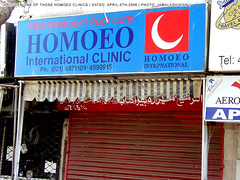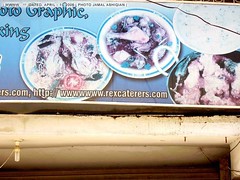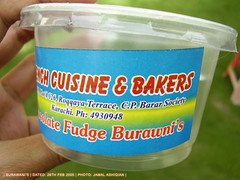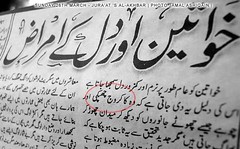Adil Najam
A couple of people have emailed to remind me that we have not had a post on Pinglish for a while. Maybe I got scared by sabizak’s reminder (here) that I should be more careful in my determination of what is or is not Pinglish. Must confess that I am still not sure what it is, even thought I offered a provisional definition of Pinglish (here); of course, this is very closely related to Hinglish. (More Pinglish posts here).
So, off I went in search of a better understanding of this thing I was calling Pinglish. What I found – hidden deep inside the crevasses of the Internet – was a delightful post on a forum called CyberMurid by someone going by the name bandali under the title ‘Pinglish, Urdish or Engdu.’ (Addition: Although I had originally found this material at the said website, we have since been informed that much of this material was part of an articel by Dr. Rauf Parikh in Dawn magazine, March 10, 2002.)
Here are the ‘techical essentials’:
A prominent feature of ‘Pinglish’ in the use of obsolete (in some cases even archaic) words and expressions. Local coinage is quite common. In some cases, this local coinage, though it may occasionally sound legitimate, would be incomprehensible or even hilarious to native ears. Sometimes, the local variety of the language sounds bookish (they ‘felicitate’, they don’t ‘congratulate’), too formal (‘do the needful’, for instance) or even ‘Un-English’. Many terms and phrases used in this part of the world are not part of the English language but have rather been ‘concocted’ and packed in a phrase-like expression. For example: pin-drop silence, cousin-brother, cutpiece and out of station (away from one’s home town). Grammatical liberties are quite interesting and pronunciation poles apart from what is known as RP (received pronunciation).
The writer goes on to give a hilarious list of examples. many of these are not ‘wrong,’ they are things that you will hear in Pakistan but those outside of our region may not understand them the way we do. Let me just share a few:
 ‘What is your good name’?
‘What is your good name’?
This may sound strange to the native ears since this is literal translation of ‘Ism-i-sharif’ in Urdu.
‘How is your good self?’
This also has a ring of Urdu. Perhaps ‘mizaj sharif’ translated.
Hotel:
It refers to an eatery as well as to any place meant for boarding and lodging. [ATP: Many of us still say ‘hotal meiN khana khana’ when we really mean restaurant].
Colony:
Forget colonialism and imperialism; in ‘Pinglish’ this refers to a large area comprising of residential blocks, for instance: Jinnah Colony, People’s Colony, Shah Faisal Colony, etc.
Cheater:
Used in colloquial Urdu (and local ‘English’, too) instead of ‘cheat’.
Bearer:
A waiter.
Affectee:
In desi English this means ‘someone affected,’ but it is not to be found in the dictionary (English dictionary, that is).
Cent percent:
Used instead of ‘a hundred per cent’ (‘per’ and ‘cent’ are put together).
Moot:
Used by some local newspapers instead of ‘meeting’.
Optical:
Used (especially by shops) in place of ‘eye glasses’.
Nullah:
Ravine; usually buses fall into ‘nullahs’ and ‘khuds’.
Dacoit:
A robber, perhaps from Urdu dakait.
Cutpiece:
A small, leftover piece of cloth; a local coinage. [ATP: See our ganderi discussion here and here].
Diggy:
The trunk of a car.
Black money:
Refers to money amassed through unfair means; another local usage, perhaps a literal translation of kala dhan
Toast:
A slice of bread whether toasted or not.
Kutcha:
Made of mud or clay, for example, a kutcha road, a kutcha house. Antonym is pucca.
Peon:
The dictionary says peon means a day-labourer; in India it meant a foot-soldier. But now, in Pakistan and India, it means ‘a messenger or office boy’.
 Eve-teasing:
Eve-teasing:
Sexual harassment.
Keep fast:
Instead of ‘fast’ (for roza); literal translation from Urdu.
Give exam:
Instead of ‘take exam’; literal translation from Urdu.
New, new things:
Literal translation from Urdu involving repetition of adjectives, such as ‘big, big cars’.
All of the original post if very well written and, importantly, is not trying to poke fingers at anyone:
This scribe is very much part of the mundane majority of Pakistanis that uses desi
At a more substantive level, bandali offers this useful and informative analysis:
Some linguists believe that a kind of ‘indigenization’ does occur when the speakers of other languages use a particular language and, according to them, when a language is used as a foreign language some ‘deviation’ may take place (because of the local milieu) and this ‘deviation’ should not be termed as a ‘mistake’. Rather, linguists like to refer to such versions as ‘regional variety’.
I do agree with this point of view, but in the case of desi English, they are not deviations or even mistakes; sometimes these are downright atrocities. I feel that if somebody wants to take revenge on the British for what they did to us during the British Raj, they should think of some other and better ways – for instance, ‘exporting’ some of our politicians to the UK for good (it will, in turn, benefit our country as well).
Some linguists, Dr Tariq Rehman, for instance, are of the view that Pakistani English is the new regional variety of the language and, therefore, should be viewed as such; i.e., something like South-Asian English or African English. This may be true, but in some instances, the ‘Urduization’ of English reaches such lengths that it sounds something like ‘Urdish’ or ‘Engdu’.
P.S. I have been unable to locate bandali and this writeup was originally posted on CyberMurid in March 2002; If someone knows who bandali is please convey to him (I assume it is ‘him’ from the name) that he has fans at ATP.
P.P.S. The photographs are from Jamsh; look at them carefully and enjoy. His photo collection is at Flickr.com and who blogs here. More Pinglish posts here.
P.P.P.S. Since having posted this, we have been informed that much of the material we had found on the CyberMurid website (now no longer functional) was part of an article by Dr. Rauf Parih in Dawn magazine (March 10, 2002).






















































One of the worst things is how people try to sound Western by twisting pronunciation even more. Most kids think speaking with an accent is cool when in fact speaking with an accent means your way of speaking is different from the norm.
Also, BY FAR the worst mistake we ALL make is confusing the ‘V’ and the ‘W’. It’s not Vater, it’s Water….there’s a big difference!!! To us it may seem like not that big of a deal but trust me, others are thrown off by it. Some people really get confused!!
Now, if you’ll excuse me, I want to drink my drink.
Oh yeah, Adil, gas comes from gasosline which is a synonym for petrol. So technically petrol pump is correct. Americans even use the word gas to mean acceleration….as in, “press the gas.” While a lot of Pakistanis use “race” to mean the same.
Couple more:
Copy (Notebook) – whereas copy refers to making photocopies
Photostate (Photocopy) – or just simply, copy
Job (Work) – people go to “job” instead of work
You guys missed one; Ladies or Ladyus used in both plural and singular sense is the Pinglish counterpart to the Urdu word ‘Khawateen (plural)’ :/ – LOL!
Roshan
On ‘Gas Station’ I have always thought that is s peculiar Americanism. After all, why call soemthing that is clearly a liquid ‘gas’ ;-)
I hope it will be an addition to our Pinglish vocabulary:
Petrol Pump (Gas Station) : None of the product is sold there with brand name “petrol” but most of the people say that they need to fill petrol (fuel).
Tuition (A fee for instruction): It is used in Pinglish as an informal coaching or learning after school or college timings.
Sui Gas (Natural Gas): The first natural gas reserves were discovered at Sui, therefore people still call it Sui Gas. The government departments are also called (Sui Nothern Gas Pipeline Limited SNGPL or Sui Souther Gas Company SSGC) which reflects our official Pinglish.
Mobile (Cell phone): Normally people in Pakistan ask “what is your mobile number?”
Speed breaker (Bump): The bumps on the road to reduce the speed of vehicle but in Pinglish we call it speed breakers.
Train’s engine (Locomotive): The locomotive is commonly called engine of the train.
Porch (garage): Porch is ” covered platform, usually having a separate roof, at an entrance to a building’ but in Pinglish porch is more a garrage for parking a car at home than an enterance.
Station (Railways Station): There are so many places like Radio Station, TV station, Police Station etc. But in Pinglish “Station” means Railways Station.